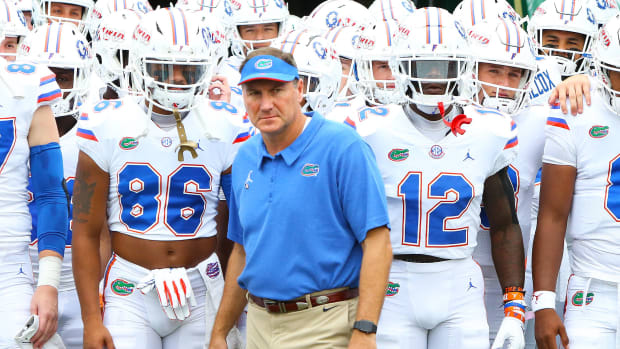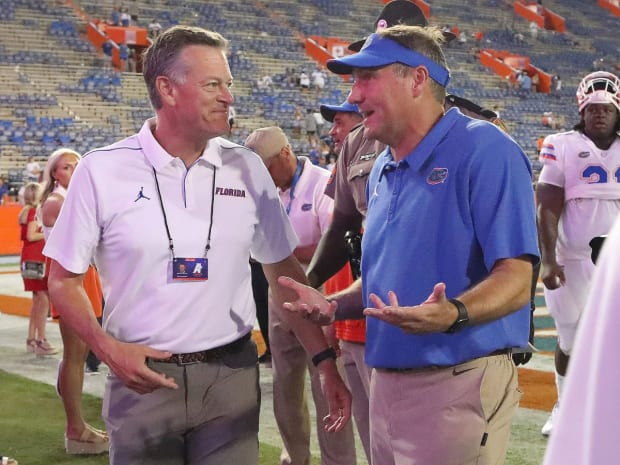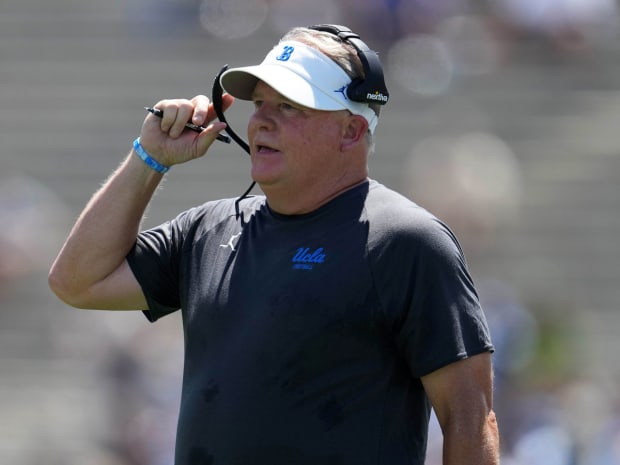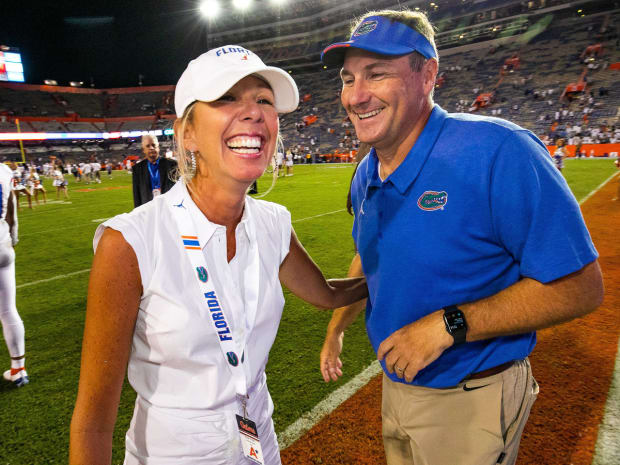In 2017 the top candidates for the Gators' job were Chip Kelly, Scott Frost and Dan Mullen. This is the inside story of how it went down.
Midday beer drinking isn’t the norm among University of Florida athletic administrators.
But these weren’t normal times.
This was a major college football coaching search. In fact, in this particular year (2017), it was the major college football coaching search. The Florida head coaching job offered the trappings of an elite gig in the industry—bountiful resources, a fertile recruiting ground, a history of winning—and it began before all other searches, a month before the regular season ended, when Jim McElwain was shown the door.
However, on day 23 of the search, it hit a snag, one bad enough to send search committee members to a local watering hole to drown their sorrows.
There they were, the people responsible for one of the most important jobs in the Sunshine State—hiring the Gators head football coach—sipping on an adult beverage at a Gainesville bar on a random Tuesday, two days before Thanksgiving, more than three weeks into this pressurized hunt and hours after that snag arose.
The candidate that university officials most courted for the job—including taking two flights to see him and even hosting his girlfriend in Gainesville—had removed his name from consideration. In a phone call, Chip Kelly told athletic director Scott Stricklin that he couldn’t do it.
“We were high on him,” says Laird Veatch, then a Florida administrator and one of the key members of Stricklin’s small search committee. “Sometimes there’s nothing left to do but go and drink.”

Brad McClenny/The Gainesville Sun/USA TODAY Network
Fast forward nearly four years and here we are.
On Saturday, the Gators host mighty Alabama.
For the first time in 19 years, The Swamp, UF’s raucous home stadium, will welcome the No. 1–ranked team in the country into its confines. The game is sold out.
“It’s the biggest game we’ve had here since the Spurrier era,” says Buddy Martin, a Florida alum and longtime sportswriter who has chronicled the Gators for years. “This is a program maker.”
On the macro level, the matchup is one of the biggest on-campus college football games since the pandemic began, bringing with it a true return to normalcy despite the COVID-19 spike—a full stadium, college pageantry, festive tailgating and, maybe, high-level football.
The Gators, 2–0 and ranked No. 11, are big underdogs, having lost much of the talent that helped coach Dan Mullen start his career by winning more games at UF (29 wins over 35 games) than any coach in school history, even ahead of Urban Meyer and Steve Spurrier. The Tide lost plenty of talent, too, but as Nick Saban’s football factory often does, it has churned out replacement specimens.
“It’s been a hard ticket to get. Alabama hardly ever comes here,” says Pat Dooley, the longtime columnist at the Gainesville Sun who is now retired. “It’s been circled on the calendar.”
Such excitement in this place couldn’t be found just a few years ago. How Florida got here is quite the circuitous journey.
Despite advancing to the SEC championship game in McElwain’s first two years, the Gators slipped into a funk in 2017. The collapse was quick but, for many in Gainesville, predictable. Florida unimpressively navigated through a weak SEC East in '15 and '16 with a sluggish offense and a fortuitous defense.
Concerns bubbled behind the scenes. For instance, some UF players worked out off campus, away from the team’s strength staff. Others left the team entirely in a wave of attrition, and several more were suspended for their role in a credit card scandal. The culture had cratered.
And then came the most peculiar last straw of any coach’s tenure. In a midseason news conference, McElwain, unprompted, suggested his players and his own family had received death threats during the Gators’ 3–3 start to the season. Unable to provide substantial evidence of such threats, McElwain had provided the university with an avenue to part ways with him on Oct. 29, 2017, and he lost $5 million from his original $12.5 million buyout.
The separation ended one of the most unusual tenures of any college football coach in the sport’s history. And it triggered a meandering, secretive 28-day search that started off with one of the most bizarre decisions: The man leading the search refused to chase after his No. 1 candidate.
“I tried really hard to find alternatives,” Stricklin acknowledges nearly four years later. “I was really hoping Chip would be interested because I didn’t want to hire Mississippi State’s coach.”

Brad McClenny/The Gainesville Sun/USA TODAY Network
Kent Fuchs, president at Florida since 2015, normally distances himself from athletic-related affairs.
The university’s athletic department, unlike many across college sports, is its own self-sustaining entity, needing no financial support from the school. Fuchs, a 66-year-old Oklahoma native, is fine with taking a backseat.
But at the start of the search for McElwain’s replacement, Fuchs turned to his athletic director with a question: “What about coach Mullen?”
“I’m not going to start there,” Stricklin quickly replied.
Stricklin is a Jackson, Miss., native, a graduate of Mississippi State and was the athletic director for the Bulldogs from 2010 to '16—until he left for Florida. His oldest daughter, Abby, attends Mississippi State. He still holds season tickets to State games, mostly used by family members. His parents, sister and brother are Bulldogs.
Stricklin left legacies at Mississippi State. He fought the SEC to legalize the program’s beloved artificial noisemakers, cowbells, and he helped create the school’s now popularized catchphrase, Hail State! As an associate AD in 2008, he was a member of a three-person search committee that eventually hired as MSU’s head coach the offensive coordinator for the Gators: Dan Mullen.
And so, during his very first football coaching search at Florida, a familiar name popped into his head.
“As soon as I had that thought, the Mississippi State part of that made it seem so challenging,” Stricklin says. “It was hard to leave Mississippi State and it was an emotional, personal decision. And to turn around and hire their most successful football coach?”
No one could convince Stricklin otherwise, nor did they really try.
A group of associate athletic directors served as his search committee. There was Veatch, now AD at Memphis, and Mike Hill, now AD at Charlotte. There was Lynda Tealer and Steve McClain, both of whom remain on staff. Stricklin also leaned on a pair of retirees for advice along the way: former UF athletic director Jeremy Foley and ex-coach Spurrier.
Led by Veatch, the group developed a long list of candidates. But three coaches emerged above the rest: former Oregon coach Chip Kelly, then working as an ESPN analyst; Scott Frost, whose second UCF team was barreling toward an undefeated season; and Mullen, in Year 9 at Mississippi State.
Because he was out of coaching, the group first targeted Kelly.
They wasted little time. On Nov. 6, one week after parting with McElwain, three search members met with Kelly at his home in New Hampshire. The trip went completely unreported. To avoid the media, Stricklin, Veatch and Tealer flew out of Orlando on a commercial flight (JetBlue, Stricklin recalls) and landed in Boston before driving to Kelly’s home.
The group was fascinated by Kelly. For a man with a spotty reputation socially, they identified with his personality and were enthralled with his football knowledge.
“It’s like you were talking to a football savant,” Veatch recalls.
The meeting lasted nearly five hours and went so well that Kelly’s girlfriend, Jill Cohen, visited Gainesville days later. Staff members wined and dined her. They took her to a popular sushi restaurant, and Tealer even worked out with her at Orange Theory.
Things seemed to be going well. But in the days following Cohen's site visit, the communication between school administrators and Kelly slowed. The coach seemed to cool on them.
And then, rather suddenly, a week before Thanksgiving, he called back.
“Come see me again,” Kelly told them, “and this time, bring your president.”

Kirby Lee/USA TODAY Sports
Buddy Martin got to the Ocala International Airport in a huff.
Wearing a baseball cap, white T-shirt and jacket, Martin, then nearly 80 years old, stood in front of a landing strip while a private jet coasted to a stop in the distance. He affixed his clothes to look somewhat presentable to the fans watching this live video on Facebook and he then stared into the camera awaiting a cue.
“You’re on!” says a voice off-screen, presumably recording this impromptu shot.
Martin began, “We believe this might be the plane behind us with the University of Florida brass just back from New Hampshire for a visit with Chip Kelly!”
Earlier that day, on Nov. 19, 2017, Martin was first to report that Florida officials were flying to visit Kelly. He broadcast the scoop on his radio show, triggering several plane-tracking journalists to stake out the airport in Ocala, about 30 minutes south of Gainesville, in an effort to catch Stricklin returning home (little did they realize that this was the group’s second trip to interview the coach).
“I still don’t know how they tracked us,” Stricklin bemoans.
Years later, Martin reveals the answer. A first responder who worked at the airport tipped off Martin with the caveat that he would not broadcast the news until the plane was in the air.
“We had to make a judgment—go or not go with the news,” he says. “We trusted him.”
The search committee, with school president Fuchs in tow, landed to see the throng of media.
While stepping out of the plane, Stricklin turned to Fuchs, “I think you can go home. I’ll take the press.”
Two days later, after Kelly called to remove his name, Stricklin found himself in that Gainesville pub, sipping on a beverage.
“I really liked Chip. I thought he was fascinating,” Stricklin now says. “I like the way his mind worked and how he worked through challenges.”
Kelly, though, was far from the only option.
Three days before visiting Kelly for a second time, members of the search committee drove to Orlando to meet with Frost on Thursday, Nov. 16, two days before Frost’s 9–0 Knights played Temple. They describe the interview with Frost as unimpressive, and they emerged with a similar feeling: He’s not ready for this big of a job.
A day later, on that Friday, Stricklin shot a text to an old friend he hadn’t spoken with in months.
“Hey, do you want to talk tomorrow?” he asked the friend.
“I’d rather wait until next week after the Egg Bowl,” Dan Mullen replied.

Kim Klement/USA TODAY Sports
Mike Hill recalls hearing the roars and then turning to the television.
While Florida battled Florida State outside in Ben Hill Griffin Stadium, search committee members confined themselves to their offices inside the very place in which the game was being played. While fielding search phone calls, they were gathered around a TV in Veatch’s office that was about seven seconds behind the actual game. They’d hear the rumble from fans before seeing the play scroll across the screen.
It often wasn’t good for the Gators. They lost, 38–22.
“I remember thinking, ‘We’re playing Florida State in football and I’m in an office,’ ” Hill says.
Search members gathered at The Swamp earlier that morning for what they knew would be the final day of this marathon ride. For more than 12 hours, starting that Saturday morning, Nov. 25, through that evening, they finalized their hire.
But it didn’t come without drama.
In the aftermath of Kelly's yanking his name from consideration, the committee turned to a surprise candidate before Saturday even arrived. Through intermediaries, Oklahoma State coach Mike Gundy suggested he’d be interested. Gundy was known to flirt with jobs only to remain at Oklahoma State with a hefty raise, and Stricklin knew this.
He spoke to Gundy by phone twice. He didn’t take it any further.
Meanwhile, at Mississippi State, things were getting interesting.
Athletic director John Cohen knew even before the season that he’d likely lose his football coach after that year. There were many signs. Mullen had rebuffed a new contract, and he had also hired agent Jimmy Sexton, known for his ability to move coaches across the college football landscape.
At some point in November, Cohen’s phone rang. It was his old friend and former boss, Stricklin.
“Scott and I shared information, but he’s not going to tell me everything,” Cohen recalls.
At one point, Stricklin told him, “If you’re asking if Dan is an option, yes, Dan is an option.’ ”
On Friday, the day after Mississippi State lost to Ole Miss in the Egg Bowl on Thanksgiving, Stricklin called Mullen. With the firing of Butch Jones, Tennessee’s job had opened as well and the Volunteers were after Mullen.
Stricklin delivered a message to the coach.
Don’t take the Tennessee job yet. Wait on us. I’ll know more tomorrow.
And so, the next morning, search committee members met at The Swamp, hoping to hammer out a hire. They were down to two candidates, with no real pecking order: Scott Frost and Dan Mullen.
Search committee members could feel Stricklin’s emotional, internal struggle. It was an enormous burden on him, says Hill. It tore him up, says Veatch.
“It was hard,” Stricklin recalls. “I was in a situation where I was either going to disappoint a bunch of people in Mississippi that I cared about or I was not going to be doing the best job for the Florida Gators.”
That morning, Stricklin and committee members spoke by phone to Frost. The Knights were rolling, having just beaten rival South Florida to complete an 11–0 regular season.
Frost was the hottest name in the cycle. Nebraska, his alma mater, was searching for a coach as well.
The Saturday morning call ended with Frost telling them he’d call back after he finished with a staff meeting.
“We are still waiting for his call,” snickers one committee member.
At some point, Stricklin phoned his wife, Anne, who was back home in Mississippi for the Thanksgiving holiday. Anne, who received a master’s degree from MSU, held similar feelings to the potential hiring of Mullen. Her husband was on the other line, emotional and distressed.
How can we take Mississippi State’s coach?
Is this the right thing to do?
This will be hard for us.
Her calming voice came through the line: “We’re going to be fine.”
At around 2:30 p.m. that Saturday, right around the time Florida and Florida State had entered the fourth quarter, Stricklin phoned that old friend of his.
“I want you to come do this,” he told Mullen.
Megan Mullen, Dan’s wife, remembers the call. She was standing in the couple’s backyard in Starkville when her husband, phone in hand, walked out of the house and toward her. The Mullens had fielded job calls almost every offseason while in Starkville. Miami, Penn State, Michigan. For whatever reason, none of them worked out.
This one was different.
“I’ve never seen the look in Dan’s eyes that I saw when he got the call that day. Sixteen years and I’ve never seen it,” she says. “I said, ‘Dan, that’s it—we’re going to Florida.’ ”

Doug Engle/USA TODAY Network
In his career, Scott Stricklin says the only decision more difficult than leaving his alma mater as athletic director was taking its football coach.
He says he has paid a “personal price” for the decision. He’s lost friends forever. Many of them expressed their displeasure through texts and emails. He betrayed his roots, some say. His reputation is tarnished forever, others contend.
“I don’t know if he’ll ever be celebrated like he should,” says Brian Hadad, a former Mississippi State student and now a radio personality who covers the team.
But so far, Stricklin’s decision has produced satisfying results.
Mullen became the first coach in FBS history to win two New Year’s Six bowl games in each of his first two seasons, and he led the program to its second-biggest turnaround in wins from 2017 (four) to '18 (10).
The buzz is back at this place, as well as the scoring. In the last two seasons, the Gators have posted eight games of 500-plus total yards. In the six previous seasons combined, they did that only six times.
Meanwhile, in Starkville, Mississippi State is 19–19 since Mullen’s departure and is on its second coach, Mike Leach.
As for Frost, his homecoming at Nebraska has gone awry. He won 12 games in his first three seasons, is now under NCAA investigation and, many feel, is likely to be fired by Christmas.
Out West, Chip Kelly is at UCLA, a hire the school made five days after the coach called Stricklin to remove his name from consideration. In an interview last week, Kelly acknowledges that he had an opportunity to coach in the SEC, but that it wasn’t the right fit. He chose UCLA, in part, because it is the No. 1 public university in the country. He wanted to coach players serious about both “books and ball,” he says.
In his fourth year with the Bruins, he’s built a team that many believe can contend for the Pac-12 South title. UCLA (2–0) has already started with a bang, beating LSU 38–27 in its second game.
Dan Guerrero, the former UCLA athletic director who hired Kelly, says the school was “laser-focused” on Kelly after firing Jim Mora Jr. He recalls flying Kelly and his agent, David Dunn, to San Francisco, for an interview on either the Tuesday or Wednesday of Thanksgiving week.
Kelly, Dunn, Guerrero, UCLA’s president and another school administrator spent hours talking from an apartment in the city, “under the veil of darkness,” he laughs.
“We knew what we were up against,” Guerrero says. “We were not going to be able to measure up from the Floridas and Tennessees of the world from a resource standpoint. But Chip is a unique guy.”
An agreement came together quickly. And on Saturday, Nov. 25, UCLA announced him as coach at 11:35 a.m., right around the time that Stricklin and search committee members were ensconced in their office wondering when Frost would call them back.
Some believe the Gators would have eventually hired Mullen no matter what. Stricklin declines to discuss specifics related to the flirtation with Frost except to say, “There were several interested candidates out there. We ended up with the right guy.”
A few minutes after offering Mullen the job, the Florida–Florida State game ended. Stricklin apologized to his new coach over the phone.
I’ve got to go down to the field and greet the players.
Without mentioning to anyone that he’d just offered Florida’s head job to Mississippi State’s coach, Stricklin shook hands with UF players and staff, the end of a dreadful game and gloomy season. He raced back up to his office and, by 10 p.m., had ironed out details with Sexton.
There was only one problem.
Tomorrow is Sunday, he reminded Sexton. That meant Anne Stricklin and their two children, all back in Mississippi for the holidays, would be attending church, likely surrounded by Mississippi State fans. The same went for his extended, church-going family who all live in the state, both in Jackson and in Starkville.
“I couldn’t have my in-laws, parents, kids being at church and someone walking up to them saying, ‘I can’t believe Scott did this!’ ” he says.
So what should we do? Sexton asked him.
Said Stricklin, “The news can’t leak until church ends.”